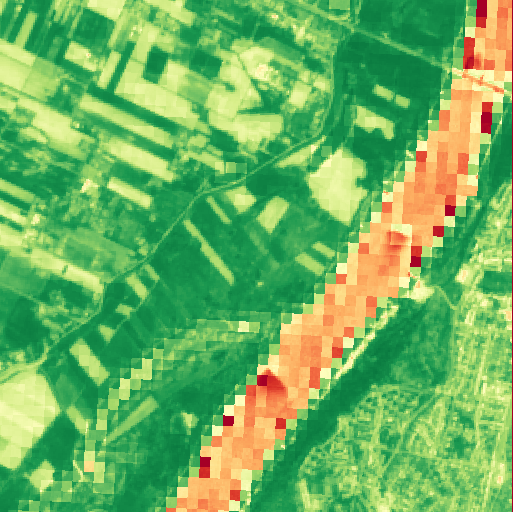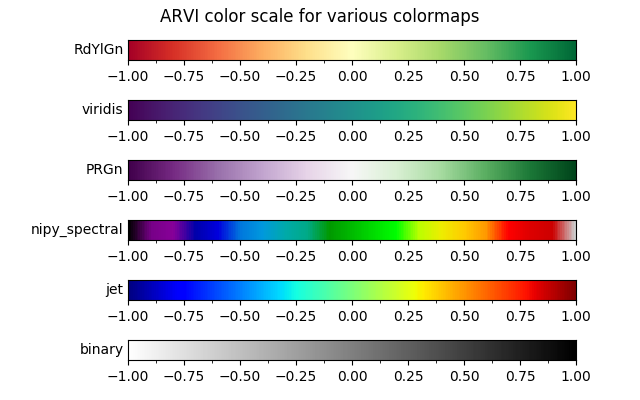ARVI Calculator¶
Block type: PROCESSING
This block takes photos from an optical satellite and calculates Atmospherically Resistant Vegetation Index (ARVI). It produces georeferenced raster output, which can be inspected visually or used for further processing. The output can be opened in GIS tools like QGIS or ArcGIS.
Supported parameters¶
colormap- the colormap, which will be used in rendering. See section Colormap for valid values.y- the quotient derived from the components of atmospheric reflectance in the blue and red channel.satellite- the name of the block providing input data. See section Supported data blocks for valid values.
Example parameters using Sentinel-2 Level 2 (BOA) AOI clipped block as data source and then rendering ARVI with RdYlGn colormap and variable \(y\) set to 0.1:
{
"sentinelhub-s2-aoiclipped:1": {
"time": "2018-05-07T16:47:48+00:00/2018-05-09T16:47:49+00:00",
"limit": 1,
"intersects": {
"type": "Polygon",
"coordinates": [
[
[
18.726196,
53.473489
],
[
18.720531,
53.479312
],
[
18.708215,
53.476043
],
[
18.719931,
53.468431
],
[
18.73332,
53.466183
],
[
18.739586,
53.471854
],
[
18.726196,
53.473489
]
]
]
},
"zoom_level": 14
},
"qzsolutions.arvi:1": {
"colormap": "RdYlGn",
"y": 0.1,
"satellite": "Sentinel-2 Level 2 (BOA) AOI clipped"
}
}
Supported data blocks¶
Currently this block supports input from data blocks:
Landsat-8 Level 1 (TOA) AOI clipped¶
To see this block on up42 please click here.
Sample block parameters when using Landsat-8 Level 1 (TOA) AOI clipped data block:
{
"colormap": "RdYlGn",
"y": 0.1,
"satellite": "Landsat-8 Level 1 (TOA) AOI clipped"
}
Formula used for ARVI calculation: \((B05 - B04 - y * (B04 - B02)) / (B05 + B04 - y * (B04 - B02))\)
Pléiades Download¶
To see this block on up42 please click here.
Sample block parameters when using Pléiades Download data block:
{
"colormap": "RdYlGn",
"y": 0.1,
"satellite": "Pleiades Download"
}
Warning
Please notice that satellite parameter does not contain ‘é’ character but ‘e’.
Formula used for ARVI calculation: \((NIR - R - y * (R - B)) / (NIR + R - y * (R - B))\)
Sentinel-2 L1C MSI Full Scenes¶
To see this block on up42 please click here.
Sample block parameters when using Sentinel-2 L1C MSI Full Scenes data block:
{
"colormap": "RdYlGn",
"y": 0.1,
"satellite": "Sentinel-2 L1C MSI Full Scenes"
}
Formula used for ARVI calculation: \((B09 - B04 - y * (B04 - B02)) / (B09 + B04 - y * (B04 - B02))\)
Sentinel-2 Level 2 (BOA) AOI clipped¶
To see this block on up42 please click here.
Sample block parameters when using Sentinel-2 Level 2 (BOA) AOI clipped data block:
{
"colormap": "RdYlGn",
"y": 0.1,
"satellite": "Sentinel-2 Level 2 (BOA) AOI clipped"
}
Formula used for ARVI calculation: \((B09 - B04 - y * (B04 - B02)) / (B09 + B04 - y * (B04 - B02))\)
SPOT 6/7 Download¶
To see this block on up42 please click here.
Sample block parameters when using SPOT 6/7 Download data block:
{
"colormap": "RdYlGn",
"y": 0.1,
"satellite": "SPOT 6/7 Download"
}
Formula used for ARVI calculation: \((NIR - R - y * (R - B)) / (NIR + R - y * (R - B))\)
Output format¶
The block produces a feature collection with up42.data_path property containing a name of the result file.
Contents of data.json file returned by a block configured in the previous example:
{
"type": "FeatureCollection",
"features": [
{
"type": "Feature",
"bbox": [
18.69873046875,
53.46189043285912,
18.74267578125,
53.48804553605621
],
"geometry": {
"type": "Polygon",
"coordinates": [
[
[
18.720703125,
53.46189043285912
],
[
18.69873046875,
53.46189043285912
],
[
18.69873046875,
53.47496999954854
],
[
18.69873046875,
53.48804553605621
],
[
18.720703125,
53.48804553605621
],
[
18.74267578125,
53.48804553605621
],
[
18.74267578125,
53.47496999954854
],
[
18.74267578125,
53.46189043285912
],
[
18.720703125,
53.46189043285912
]
]
]
},
"properties": {
"up42.data_path": "fa91ec13-5f7e-41f4-ad24-db8a267e9d50.tiff",
"acquisitionDate": "2018-05-08T09:50:28"
}
}
]
}

Contents of file fa91ec13-5f7e-41f4-ad24-db8a267e9d50.tiff¶
Legend is in section RGB Output.
Capabilities¶
Input¶
This block has such input_capabilities:
"input_capabilities": {
"raster": {
"up42_standard": {
"format": {
"or": [
"SAFE",
"GTiff",
"DIMAP"
]
},
"sensor": {"or": ["Landsat8", "Sentinel2", "SPOT", "Pleiades"]},
"bands": ["red", "blue", "nir"]
}
}
}
Warning
Please ensure that input block is listed under Supported data blocks section.
Output¶
This block has such output_capabilities:
"output_capabilities": {
"raster": {
"up42_standard": {
"format": "GTiff",
"dtype": {"or": ["uint8", "float"]},
"resolution": ">"
},
"custom": {
"bands": [
"arvi"
]
}
}
}
If colormap is set to id then output type is float. Otherwise it’s uint8.
Colormap¶
ARVI is always in \([-1, 1]\) range. There are two possible output types: RGB output and raw output.
The output type is controlled with colormap parameter (see Colormap).
RGB Output¶
We can visualize ARVI as RGB GeoTIFF file. Colormap assigns color to each possible index value.
A legend for commonly used color maps is in the figure below.

Commonly used colormaps¶
This block supports any predefined Matplotlib colormaps.
Set colormap parameter to requested colormap name (see Colormap).
Raw Output¶
It is possible to get raw output, i.e. single band GeoTIFF file with float32 matrix containing ARVI values.
Set colormap parameter to id (see Colormap).
{
"colormap": "id",
"y": 0.1,
"satellite": "SPOT 6/7 Download"
}
Such files can be manually colorized in QGIS with singleband pseudocolor. It is possible to read ARVI value for particular pixel with Identify Features tool.
Other usage of such files is further processing in Python or as an input for other up42 processing blocks.